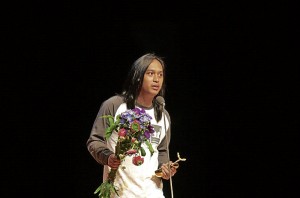Filipino indie filmmaker Jet B. Leyco recalls that the road to the Jeonju International Film Festival, where his debut movie, “Ex Press,” recently won the special jury prize, was fraught with hardship and danger.
Leyco, who works as director and cinematographer for ABS-CBN News and Current Affairs, recounts that he stumbled upon the idea for his film while on assignment. He has labeled it a “spontaneous accident.”
It was originally a short film, a thesis project at the end of his one-year study grant at the Asia Pacific Film Institute.
While shooting footage for “Patrol ng Pilipino,” he decided to make a full-length film on the 14-hour train ride from Manila to Bicol.
In Naga, the train was derailed following a downpour. “I thought it could be a plot twist,” he recounts. “The concept was still blurry; I just wanted to start shooting. I asked our production coordinator Don Fulgado and cameraman Nestor Depositar to be the actors in my film, which still had no script.”
While shooting in Bicol, he met a man who told stories of atrocities committed by the police against people who used to throw rocks at passing trains in the 1980s and 1990s.
The man’s story haunted Leyco. His film took an unexpected turn, transforming into a meditation on human rights violations committed in the country through the years.
He continued to shoot, ending up with six hours of footage. Thus, the biggest challenge came during the editing stage. “My problem was stitching the images together. In between editing, I had writing sessions as well and shot additional scenes to complete the story and strengthen the characters.”
Digital technology was a boon. “I used only a DSLR camera, which was ideal in cramped spaces,” he says.
They got it
In Jeonju, critics clearly understood the central metaphor. Though the train symbolizes movement, it also suggests stagnation and, ultimately, misfortune. “It’s about a dysfunctional society that tries to be progressive without first solving its own history of conflicts,” Leyco explains.
Cho Jae-un hails “Ex Press” as “lyrical … centering on a dream about trains and the sinister events surrounding it,” while Jeon Byoung-won describes it as “an edgy cocktail of fiction and documentary … ”
Leyco had three screenings in the Korean fest. He relates: “The first was sold out. I had brought only a DVCAM (copy of the film). I think my film was the only entry that wasn’t HD (high-definition) or DCP (digital cinema package). I didn’t have enough funds for the transfer. Still the screenings went well.”
The foreign viewers were interested mostly in his filmmaking process, the technical aspects of combining color and black-and-white images and mixing docu and fiction, Leyco says.
He regards festivals as an opportunity for local indie filmmakers to join the ongoing international discourse on cinema. “The focus was to discuss cinema, culture and society. The open forums after the screenings were healthy exercises.”
Leyco is proud to win in the same Korean festival as compatriots Remton Siega Zuasola (2011) and Sherad Anthony Sanchez (2009). Coincidentally, Lav Diaz, for whom Leyco worked
SCENE from “Ex Press,” described by a Korean critic as “an edgy cocktail of fiction and documentary.” Photo courtesy of Jet B. Leyco
as intern, won the Netpac prize for “Florentina Hubaldo, CTE” in this year’s Jeonju, too.
“It was a big bonus,” Leyco says of his own victory. “It was unexpected, but fulfilling … Our only mission in Jeonju was to screen our film and share our process and intentions.”
Next stop for “Ex Press” is the Open City London Documentary Festival from June 20 to 24.
Since the award in Korea came with a cash prize of KRW 7 million ($6,017.88), Leyco says he can now plan his sophomore outing: “I want to do a narrative film. My debut was a spontaneous undertaking and yet I spent P15,000 of my own money. For my next film, I want to work with a budget.”
